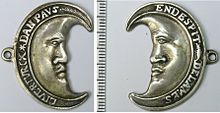Popery: Difference between revisions
m Robot - Moving category History of Roman Catholicism in Britain to History of Roman Catholicism in Great Britain per CFD at Wikipedia:Categories for discussion/Log/2011 January 22. |
// Irrelevant Material |
||
| Line 14: | Line 14: | ||
Although the term is not as common today as in the past, some continue to use it.<ref>[http://www.orthodoxchristianbooks.com/articles/259/letter-a-papist/ Vladimir Moss, ''Letter to a Papist'']</ref><ref>[http://www.ianpaisley.org/article.asp?ArtKey=oaths Ian Paisley, ''Papist Doctrine of Oaths'']</ref> |
Although the term is not as common today as in the past, some continue to use it.<ref>[http://www.orthodoxchristianbooks.com/articles/259/letter-a-papist/ Vladimir Moss, ''Letter to a Papist'']</ref><ref>[http://www.ianpaisley.org/article.asp?ArtKey=oaths Ian Paisley, ''Papist Doctrine of Oaths'']</ref> |
||
There is a recent case of a Roman Catholic who uses the term as a self-identifying label by which to show support for and fidelity to the pope.<ref>[http://www.catholicvote.org/discuss/index.php?show=papist, American Papist]</ref> |
|||
==See also== |
==See also== |
||
Revision as of 15:22, 3 February 2011

Papist is a term, usually disparaging or an anti-Catholic slur, referring to the Catholic Church, its teaching, practices or adherents. It was coined during the English Reformation to denote a Christian whose loyalties were to the Pope, rather than to the Church of England. Over time, however, it came to mean one who supported Papal authority over all Christians and thus became a popular term, especially among Anglicans and Presbyterians. The word, dating from 1534, derives via Middle French from Latin papa, meaning "Pope".[2]
The word was in common use until the mid-nineteenth century, as shown by its frequent appearance in Macaulay's History of England from the Accession of James II and in other historical or controversial works of that period. It also appeared frequently in the compound form "Crypto-Papist".[3][4][5]

The word is found in certain surviving statutes of the United Kingdom, for example in the English Bill of Rights of 1688 and the Scottish Claim of Right of 1689. Under the Act of Settlement enacted in 1701, no one who professes "the popish religion" or marries "a papist" may succeed to the throne of the United Kingdom. Fears that Catholic secular leaders would be anti-Protestant arose during the suppression of the Catholic Church in England during the reign of Henry VIII and the subsequent persecution of Protestants during the reign of the Catholic Mary I of England.
A similar term, "papalism", is sometimes used.[6]
Jonathan Swift (1667-1745) author of Gulliver's Travels, frequently uses the term in his satirical work A Modest Proposal in which he proposes selling Irish children to be eaten by wealthy English landlords.
During the 1928 US presidential election, Democratic Party nominee Al Smith was accused of being a papist. He was the first Catholic to ever receive presidential nomination from a major party and this led to fears that, if he were elected, the United States would be ruled by the Vatican.[7] So far, only in 1961, with the election of John F. Kennedy, has a Catholic become United States President.
Although the term is not as common today as in the past, some continue to use it.[8][9]
See also
- Anti-Catholicism
- Bigotry
- Mackerel Snapper
- Popish Plot
- Religious intolerance
- Romanism
- Anti-clericalism
References
- ^ Bulut, Mehmet (2001). Ottoman-Dutch economic relations in the early modern period 1571-1699. Uitgeverij Verloren. p. 112. ISBN 9789065506559.
- ^ papist, Merriam Webster Online
- ^ Walter Walsh, The Secret History of the Oxford Movement (C.J. Thynnes, 1898), pp. 8 and 187
- ^ The American National Preacher, August 1851, Sermon DLIII, p. 190
- ^ Alexis Khomiakhov, a Russian lay theologian of the nineteenth century, wrote, "All Protestants are Crypto-Papists" (Bradley Nassif, Stanley N. Gundry, James J. Stamoolis, Three views on Eastern Orthodoxy and evangelicalism, p. 20).
- ^ Dr J. J. Overbeck and His Scheme for the Re-establishment of the Orthodox Church in the West
- ^ Michael O'Brien, John F. Kennedy: A Biography, Thomas Dunne Books, 2005, p. 414.
- ^ Vladimir Moss, Letter to a Papist
- ^ Ian Paisley, Papist Doctrine of Oaths
